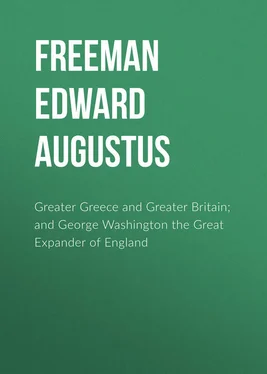Edward Freeman - Greater Greece and Greater Britain; and George Washington the Great Expander of England
Здесь есть возможность читать онлайн «Edward Freeman - Greater Greece and Greater Britain; and George Washington the Great Expander of England» — ознакомительный отрывок электронной книги совершенно бесплатно, а после прочтения отрывка купить полную версию. В некоторых случаях можно слушать аудио, скачать через торрент в формате fb2 и присутствует краткое содержание. Жанр: foreign_antique, foreign_prose, на английском языке. Описание произведения, (предисловие) а так же отзывы посетителей доступны на портале библиотеки ЛибКат.
- Название:Greater Greece and Greater Britain; and George Washington the Great Expander of England
- Автор:
- Жанр:
- Год:неизвестен
- ISBN:нет данных
- Рейтинг книги:4 / 5. Голосов: 1
-
Избранное:Добавить в избранное
- Отзывы:
-
Ваша оценка:
- 80
- 1
- 2
- 3
- 4
- 5
Greater Greece and Greater Britain; and George Washington the Great Expander of England: краткое содержание, описание и аннотация
Предлагаем к чтению аннотацию, описание, краткое содержание или предисловие (зависит от того, что написал сам автор книги «Greater Greece and Greater Britain; and George Washington the Great Expander of England»). Если вы не нашли необходимую информацию о книге — напишите в комментариях, мы постараемся отыскать её.
Greater Greece and Greater Britain; and George Washington the Great Expander of England — читать онлайн ознакомительный отрывок
Ниже представлен текст книги, разбитый по страницам. Система сохранения места последней прочитанной страницы, позволяет с удобством читать онлайн бесплатно книгу «Greater Greece and Greater Britain; and George Washington the Great Expander of England», без необходимости каждый раз заново искать на чём Вы остановились. Поставьте закладку, и сможете в любой момент перейти на страницу, на которой закончили чтение.
Интервал:
Закладка:
Edward A. Freeman
Greater Greece and Greater Britain; and George Washington the Great Expander of England / Two Lectures with an Appendix
PREFACE
These two lectures were given quite independently, the former to the Students’ Association at Edinburgh on December 22nd, 1885, and the latter as a public lecture in the University of Oxford on Washington’s birthday, February 22nd, 1886. As they were written for two different audiences, and as one leading idea ran through both, there was naturally a good deal of repetition, sometimes even to the very words. This I have, in revising them for the press, done my best to get rid of. They appear now as two discourses, looking at the same general subject from two somewhat different points of view, and each putting different points more prominently forward. To these I have added, as an Appendix, such parts as were not immediately temporary of an article which appeared in Macmillan’s Magazine for April, 1885, under the heading of “Imperial Federation.” In this article, written only to be read and not to be heard, some points which were treated in a more rhetorical way in the lectures are dealt with in a style of more minute argument. It seemed therefore to make a fitting commentary on the lectures.
Cahors,April 7th, 1886 .
GREATER GREECE AND GREATER BRITAIN
The name of Greater Britain is one which of late years has become strangely familiar. It is possible that a generation back the words might have fallen harshly on patriotic ears. We were then used to believe that the Britain in which we lived was so great that there could be none greater. The name of “Great Britain” was perhaps used without any very clear notion of its history; but it was at least accepted as implying greatness of some kind. Whatever may have been the exact meaning with which the name of “Greater Britain” was first brought in, it was, we may be sure, suggested by the seemingly older phrase of “Great Britain.” Those who first spoke of “Greater Britain” perhaps hardly knew that the name is as old as that of “Great Britain,” and, more than this, that “Great Britain” and “Greater Britain” are in truth phrases of exactly the same meaning. I would not venture to say how much older the name of “Magna Britannia” may be than its somewhat irregular employment in the royal style by James Sixth and First. But “Greater Britain,” “Major Britannia,” is undoubtedly as old as the twelfth century. We perhaps sometimes forget that, besides this our isle of Britain, there is another Britain on the continent, no other than the land which, by a slight change of ending, we commonly call Britanny. But in Latin and in French the two names are the same, Britannia and Bretagne . The one land is Bretagne , the other is Grande-Bretagne ; the one is Britannia minor , the other is Britannia major . In short, the Britain of the island, the Great or Greater Britain, was so called simply to distinguish it from the Lesser Britain on the mainland.
Here, be it remarked, the Greater Britain is the older, the Lesser is the younger; the Greater is the mother-country, the Lesser is the colony. The Lesser Britain of the mainland never took that name till it was settled by men fleeing from the Greater Britain in the island. Now in the sense in which we have of late years heard the phrase “Greater Britain,” all this has been turned the other way. “Great Britain” is not simply opposed to a Lesser Britain; it is opposed to a Britain which is confessedly great, but, it would seem, not so great as the Greater. And of these the one which is simply Great is the elder; the Greater is the younger; the Great is the mother-country, the ruling country; the Lesser is the plantation, the dependency, or rather an aggregate of plantations and dependencies all over the world. The change, the contrast, between the old use of “Major Britannia” and the new use of “Greater Britain” is so very singular that one is driven to ask whether those who brought in the new use ever had the old one in their thoughts at all.
But the question becomes more curious still when we bear in mind that there was in a distant age of the world an use of a kindred phrase which is strikingly like, not the old, but the new use of the phrase “Greater Britain.” As there was a Greater and a Lesser Britain, so there was, perhaps not a Lesser, but assuredly a Greater Greece. And the Greater Greece did not answer to the “Major Britannia” of our older use, but to the “Greater Britain” of our newer. The Greater Greece was not an older Greece from which settlers went forth, as they went forth from the Greater Britain of old, to found a younger and a lesser. The Greater Greece, like the Greater Britain of modern times, was an assemblage of settlements from the elder Greece which were deemed, or deemed themselves, to have become greater than the mother-country. The Great or the Greater Greece (Ἡ μεγάλη Ἑλλάς, Magna Græcia , Major Græcia ) became the received geographical name for the Greek colonies in Southern Italy. And they may be thought to have deserved the name in that short and brilliant time when those colonies distinctly outstripped the mother-country, when Sybaris and Tarentum ranked among the greatest cities of the earth, more brilliant and flourishing, beyond doubt, than Athens or Sparta or Corinth or any other of the cities of the older Hellenic land.
As in the former case the contrast, so in this case the analogy, is so striking that we again cannot help asking whether those who brought in the modern phrase of “Greater Britain” ever had it in their minds? One point of unlikeness however must be mentioned. By “Greater Britain” seems now to be commonly meant the whole aggregate of the scattered colonies and dependencies of the Great or Lesser Britain – those names have in the new use become synonymous – all over the world. But the name Greater Greece by no means took in all the scattered Greek colonies all over the world; it was confined to a single group of them. The name seems hardly to have spread from Southern Italy even to the neighbouring island of Sicily; it was certainly never applied to the Greek settlements in Asia or Libya or any other part of the world. Indeed the name had a peculiar fitness as applied to the Greek settlements in Southern Italy which it could not have had elsewhere. The geographical structure of the land enabled Southern Italy to put on the character of a second Greece in a way in which none other among the lands in which Greeks settled could put it on. Everywhere else out of old Greece there was merely a Greek fringe along the coast. For the Greek settlements were planted mainly on islands and promontories, along the coasts of solid continents the inland parts of which remained barbarian. Even in Sicily the Greek settlements strictly so called were little more than a fringe; the inland parts of the island did indeed in the end become Greek; but it was not by real Greek settlement, but by the spread of the Greek tongue and of Greek culture among men of other nations who became Greek by adoption. In Southern Italy alone, the shape of the land, branching off into two narrow peninsulas, enabled Greek settlement to become something more than a fringe on the coast, and to spread, as in the older Greek land, from sea to sea.
Thus then there were two lands, an older and a newer, in which it might be said, at all events at the first aspect, that the whole land was Greek. No doubt there was this difference, that in the older Greece all was, as far as we can see, Greek in the strictest sense, while in the younger Greece much was Greek only by assimilation and adoption. In the older Greece, if any relics lived on from times and people older than the first Hellenic settlements, they had been assimilated to the Greek mass before recorded history began.
Читать дальшеИнтервал:
Закладка:
Похожие книги на «Greater Greece and Greater Britain; and George Washington the Great Expander of England»
Представляем Вашему вниманию похожие книги на «Greater Greece and Greater Britain; and George Washington the Great Expander of England» списком для выбора. Мы отобрали схожую по названию и смыслу литературу в надежде предоставить читателям больше вариантов отыскать новые, интересные, ещё непрочитанные произведения.
Обсуждение, отзывы о книге «Greater Greece and Greater Britain; and George Washington the Great Expander of England» и просто собственные мнения читателей. Оставьте ваши комментарии, напишите, что Вы думаете о произведении, его смысле или главных героях. Укажите что конкретно понравилось, а что нет, и почему Вы так считаете.












